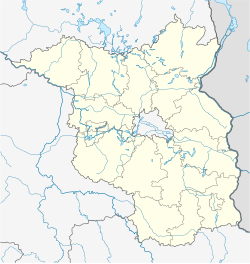Mescherin
Mescherin | |
|---|---|
 Church in Mescherin | |
Location of Mescherin within Uckermark district  | |
| Coordinates: 53°15′00″N 14°26′00″E / 53.25°N 14.4333°E | |
| Country | Germany |
| State | Brandenburg |
| District | Uckermark |
| Municipal assoc. | Gartz (Oder) |
| Government | |
| • Mayor (2024–29) | Udo Augustinat[1] |
| Area | |
• Total | 30.96 km2 (11.95 sq mi) |
| Elevation | 4 m (13 ft) |
| Population (2022-12-31)[2] | |
• Total | 787 |
| • Density | 25/km2 (66/sq mi) |
| Time zone | UTC+01:00 (CET) |
| • Summer (DST) | UTC+02:00 (CEST) |
| Postal codes | 16307 |
| Dialling codes | 033332 |
| Vehicle registration | UM |
| Website | www.gartz.de |
Mescherin is a municipality in the Uckermark district, in Brandenburg, in north-eastern Germany. It is located on the western shore of the Oder river and the German-Polish border.
Overview
[edit]A road bridge links Mescherin with the Polish-Pomeranian town of Gryfino across the river. The nearest city is Szczecin, about 20 km (12 mi) to the north. Mescherin is located on the northern edge of Lower Oder Valley National Park.
On December 31, 2002, the municipalities of Neurochlitz, Radekow and Rosow were incorporated into Mescherin. In Rosow, a 13th-century church serves as a joint German-Polish memorial site for the flight and expulsion of Germans during and after World War II and the resettlement of Poles from Soviet-annexed eastern Polish territory into former eastern German provinces which became part of Poland in 1945. Rosow was chosen as the Pomeranian village became a border checkpoint of both the federal highway Bundesstraße 2 and the Berlin-Szczecin railway.
Demography
[edit]
|
|
|
References
[edit]- ^ Landkreis Uckermark Wahl der Bürgermeisterin / des Bürgermeisters. Retrieved 10 July 2024.
- ^ "Bevölkerungsentwicklung und Bevölkerungsstandim Land Brandenburg Dezember 2022" (PDF). Amt für Statistik Berlin-Brandenburg (in German). June 2023.
- ^ Detailed data sources are to be found in the Wikimedia Commons.Population Projection Brandenburg at Wikimedia Commons


 French
French Deutsch
Deutsch

